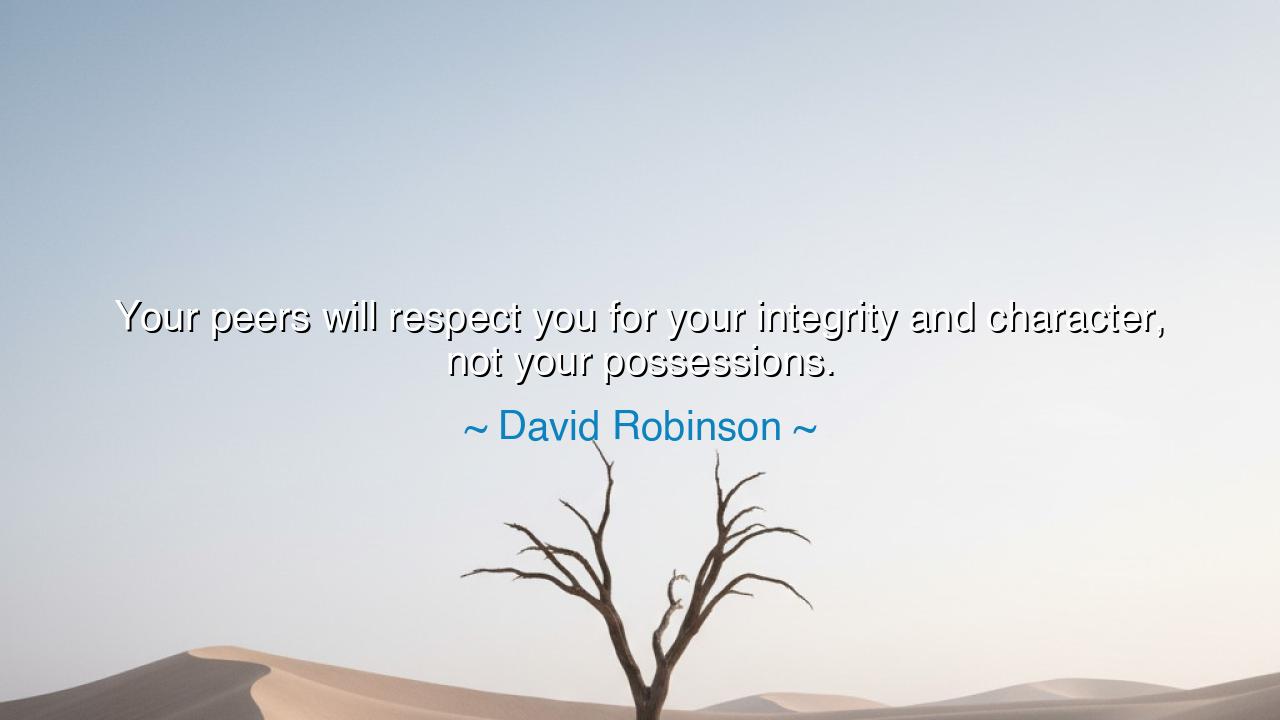
Your peers will respect you for your integrity and character, not






Hear the wisdom of David Robinson, a man renowned not only for his strength upon the court, but for his humility of spirit: “Your peers will respect you for your integrity and character, not your possessions.” These words strike like a hammer against the illusions of this world, shattering the fragile idols of wealth and vanity. For possessions are but dust, fleeting and fragile, but character—that invisible fortress of the soul—endures and commands honor across generations.
The ancients knew this truth well. They told us of kings who adorned themselves with jewels and armies, yet were forgotten when their treasures rotted and their thrones crumbled. But they also spoke of wise men who possessed little, yet whose names endure because of their integrity. Socrates, who owned no wealth and sought no luxury, still commands the respect of sages thousands of years later, because he would rather drink hemlock than betray his principles. His story shows us: respect is won not by gold but by truth lived without compromise.
David Robinson, though surrounded by the temptations of fame, wealth, and applause, speaks from lived experience. Known as “The Admiral,” he achieved greatness in basketball, yet he is remembered just as much for his humility, generosity, and devotion to others. His legacy does not rest in trophies or possessions, but in the respect of teammates and peers who saw in him a man of character. This is the meaning of his words: that when all else fades, it is not what you held in your hands, but what you held in your heart that will define you.
Consider the story of Marcus Aurelius, emperor of Rome, who ruled over vast lands and countless riches. Yet in his Meditations, he scorned possessions and glory, reminding himself daily that what matters is to live justly, kindly, and truthfully. He knew that empires fall, but integrity endures. The emperor who could command any treasure chose instead to treasure virtue above all, leaving behind not only monuments of stone, but monuments of wisdom that still shape the lives of men.
The meaning of Robinson’s teaching is clear: possessions may dazzle, but they cannot inspire. They may win envy, but never true respect. The wealthy man may command attention, but if his spirit is corrupt, he is despised when his back is turned. Meanwhile, the one who walks in honesty and treats others with dignity, though poor in goods, is rich in esteem. Character is the currency of eternity; possessions are the coinage of a fleeting hour.
The lesson for us is urgent: pursue not possessions, but integrity. Let your daily actions be guided by truth, fairness, and compassion. Do not measure yourself by the car you drive, the clothes you wear, or the wealth you display, for such things are smoke in the wind. Instead, measure yourself by your faithfulness to your word, your treatment of others, and the honor you carry in both public and private. For this is the foundation upon which true respect is built.
What then shall we do? Let us live so that when our peers speak of us, they speak not of what we owned, but of who we were. Let us strive to be remembered as just, kind, and courageous. Give generously, speak truthfully, act humbly—these are the treasures that thieves cannot steal and time cannot tarnish. For in the end, the only wealth that remains is the respect earned through character and integrity.
Therefore, O listener, etch these words upon your heart: Respect is not bought, it is earned; and possessions perish, but character endures. If you live by this, you will live as the ancients taught and as the wise still proclaim—that greatness is not measured in gold or stone, but in the timeless honor of a life well lived.






AAdministratorAdministrator
Welcome, honored guests. Please leave a comment, we will respond soon